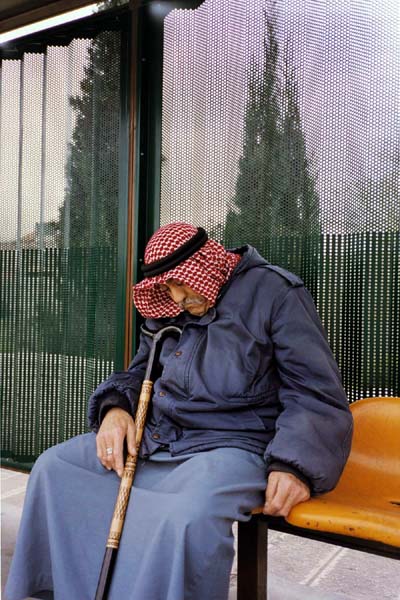|
Big
Squeeze: Palestinians Caught In An Economic Vise
|
|
by Marguerite Reardon
|
Six years ago Maria Khoury and her husband David, moved from Boston back to the small Palestinian village where her husband grew up to start a microbrewery. Back then, they thought peace between Israel and Palestine was possible. But now, six months after the violence erupted in the West Bank, they struggle to keep that hope alive as they watch the collapse of the economic fabric around them. As more violence brings on tighter Israeli presence and as tensions mount, Maria says she thinks of taking her family back to Boston.
"There's only just so much I can take," she says. "Things are just so hard here now."
David Khoury and his brother Nadim, who had also been living in the United States, were lured back to their West Bank village of Taybeh after the Oslo accords were signed in 1993. At the time, the Israeli government offered tax incentives to encourage Palestinian entrepreneurs to start businesses in the occupied areas. To the brothers and their families, this was a great opportunity to return to the village where Khourys had lived for over 500 years. It also gave them a chance to help build a new and independent Palestine.
"We wanted to start a business and show people that something of quality could come out of Palestine," says Maria Khoury. "We wanted the Israelis to see that we could survive on our own."
 |
Last summer before the trouble began in the West Bank, the Taybeh Beer brewery was buzzing with more than a dozen Palestinian workers bottling beer and loading and unloading trucks. But six months later, the situation is much different at the small family owned microbrewery. In January after months of declining sales, Taybeh Beer was forced to lay off all of its 13 workers.
"We didn't have anything coming in," says Maria Khoury. "We tried to keep people as long as we could, but you get to a point where there just isn't any money left to pay people."
Now the brewery looks a bit like a ghost town. Cases of empty, unused bottles imported from Portugal are stacked up toward the ceiling, sacks of Beligian barley and Czech hops sit unused, and the once buzzing brewery is quiet.
"We had been doing very well," says Maria Khoury. "Business was great. We even expanded our product line last year to include a new light beer and a dark beer."
Since the majority of residents in the surrounding West Bank are Muslim and don't drink alcohol, Taybeh Beer's core customer base has been hotels and restaurants in the area that cater to Christian pilgrims.
After gaining its kosher seal of approval from the rabbinical authorities, Taybeh Beer managed to find a following among beer drinking Israelis, who can buy it in bars and restaurants in Jerusalem, Nazareth and Haifa. But since the latest intifada began back in late September, business has dropped off considerably. The sharp decline in tourism has caused many of the restaurants and hotels that used to buy Taybeh Beer to go out of business. Another major factor is that Israel has closed many of the roads leading into major West Bank cities like Ramalah and Bethlehem, as well as the entrance into Jerusalem. While Israeli officials say they have done this for security purposes, many Palestinians, like Maria Khoury, believe that the roadblocks have done nothing except punish the entire Palestinian population and send the economy into ruin. Not only are workers often unable to get to and from their jobs, but businesses, like Taybeh Beer, that rely on the roads to move their merchandise have also been affected by closings and long delays at check points, she adds.
A United Nations study released in February estimates that the West Bank and Gaza have lost about $1.5 billion in income and business opportunities since the start of the uprising. Unemployment in the territories has more than tripled since October, from about 11 percent to about 38 percent, and poverty has risen by about 50 percent, according to the U.N. figures. Economic conditions will most likely continue to get worse before they get better as the conflict continues to escalate. This has caused the handful of Palestinians who have the opportunity to leave the region to emigrate to other parts of the world.
As for Maria Khoury, she says her thoughts of moving back to Boston are still only momentary lapses. She says she is committed to staying in the West Bank as long as she can. She still dreams of peace and with it, she hopes that someday Taybeh Beer will once again be a flourishing business.